|
February 2, 2021 - No. 1
As 2021 Gets Underway
Impotence of the Ruling Elite Regarding Economic and Health Crises  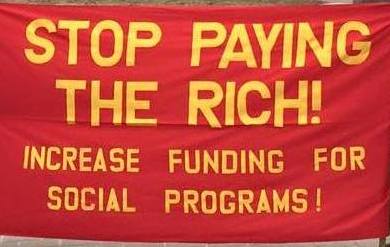
• High Unemployment Reveals Depth of Crisis
• December Labour Force Survey
Curbing the Spread of the COVID-19 Pandemic
• Workers' Organizing for Solutions Remains Key
- Pierre Chénier
• Addressing Matters of Serious Concern in the Health Care Sector
• Ontario Extends "Stay at Home" Order
- Steve Rutchinski
• Administrative Court Orders Nurses to Stay on the Job
- Pierre Soublière
Interviews
• "We Are Not Giving Up on Anything -- Help Us to Help You!"
- Marjolaine Aubé
• Demands of Ontario Frontline Workers
- Jason Fraser
As 2021 Gets Underway
The ruling elite in Canada are expressing dismay at their inability
to even explain how to combat the twin economic and health crises, let
alone propose anything concrete. Leaders of the cartel parties in
Parliament and economists are said to be bewildered and feel helpless
in the face of the continuing crises and are reduced to saying how
bad things are and attacking one another for not doing more.
 Words
expressing dismay at the continuing twin crises and attacking one
another are of little use, as are appeals that the rulers should listen
to the workers and respect them. The only meaningful action is to
encourage the fighting contingents of the working class in workplaces
across the country, as well working people in the communities and
teachers and staff in the educational institutions to mobilize
themselves directly to deal with the economy and the value it produces
in the context of how the twin crises of the economy and the health
care system can be solved for the common good. Words
expressing dismay at the continuing twin crises and attacking one
another are of little use, as are appeals that the rulers should listen
to the workers and respect them. The only meaningful action is to
encourage the fighting contingents of the working class in workplaces
across the country, as well working people in the communities and
teachers and staff in the educational institutions to mobilize
themselves directly to deal with the economy and the value it produces
in the context of how the twin crises of the economy and the health
care system can be solved for the common good.
Workers' Forum will continue to give space for demands and
actions which favour the workers, including the demand to stop paying
the rich, for not-for-profit health care, long-term care and seniors'
homes and similar measures which benefit the people and help resolve
the crises in their favour. 
As 2021 gets underway, the number of unemployed workers in Canada continues to soar.
Official unemployment of workers looking for work and unable to find
a job rose to 1,755,800 persons in December 2020. This indicates
636,000 more unemployed workers compared with February 2020. Also
488,000 employed Canadians reported in December they were working less
than half their usual weekly hours.
 The
number of Canadians 15-years old and over in December was 31,297,700.
This number is considered the potential workforce. The actual workforce
was 20,308,800 persons. Of these, 15,188,300 were employed full time,
3,364,700 employed part time and 1,755,800 were unemployed. The
percentage of workers in the actual workforce yet
underutilized either as unemployed or working less than half their
usual hours was 17.1 per cent for December, affecting 3,472,805 workers. The
number of Canadians 15-years old and over in December was 31,297,700.
This number is considered the potential workforce. The actual workforce
was 20,308,800 persons. Of these, 15,188,300 were employed full time,
3,364,700 employed part time and 1,755,800 were unemployed. The
percentage of workers in the actual workforce yet
underutilized either as unemployed or working less than half their
usual hours was 17.1 per cent for December, affecting 3,472,805 workers.
The drop in the workforce participation rate plus the large number
of unemployed and underemployed mean a loss of potential social value
for the country. The workers not working in the socialized economy are
not producing social wealth. The refusal of the ruling elite to
organize universal free childcare and early learning for all children
is a
block to the economy meeting its potential.
The refusal of ruling elites to challenge monopoly right and its
expropriation of the added-value workers produce drains needed social
value from the economy and country that could be used for increased
investments in social programs and public services.
The refusal to challenge monopoly right to realize (pay for) the
social value they consume from educated and healthy workers as social
reproduced-value but instead allow the oligarchy to expropriate it as
private profit deprives public education, health care and other social
programs of the funds they require to meet and guarantee the needs and
rights of Canadians. 
The December 2020 Labour Force Survey from Statistics Canada
painted a grim picture as workers experienced a net loss of 63,000
jobs. Statscan said an additional 42,000 people dropped out of the
workforce altogether with "core-aged women and male youth" being
"largely responsible for the fall."
"The monthly drop in self-employment more than offset the increase
seen over the previous two months and brought the number of
self-employed workers to its lowest point since the onset of the
COVID-19 pandemic, or 6.8 per cent (-198,000) lower than in February.
In contrast, the number of private-sector employees was 4.1 per cent
(-512,000) lower than in February while public sector employment was
1.9 per cent (+73,000) higher . On a year-over-year basis,
self-employment was down by 192,000 (-6.6 per cent) in December, with
the largest declines in construction; transportation and warehousing;
and health care and social assistance (not seasonally adjusted). The
bulk of
the decline was among core-aged workers, mostly men (not seasonally
adjusted)," Statscan reports.
"The number of active businesses in September was 7.2 per cent lower than in February 2020," it adds.
Of note is that total hours worked in December fell for the first
time since April 2020, declining 0.3 per cent. Statscan says, "This
decline was driven by losses in the accommodation and food services,
and the 'other services' industries (which include personal and laundry
services). Smaller declines were observed in business, building and
other
support services, and natural resources. [...] In December, total hours
worked were 5.3 per cent below February levels, with hours lost by
self-employed workers accounting for over two-fifths (44.3 per cent) of
the overall decline."

Curbing the Spread of the COVID-19 Pandemic
- Pierre Chénier - 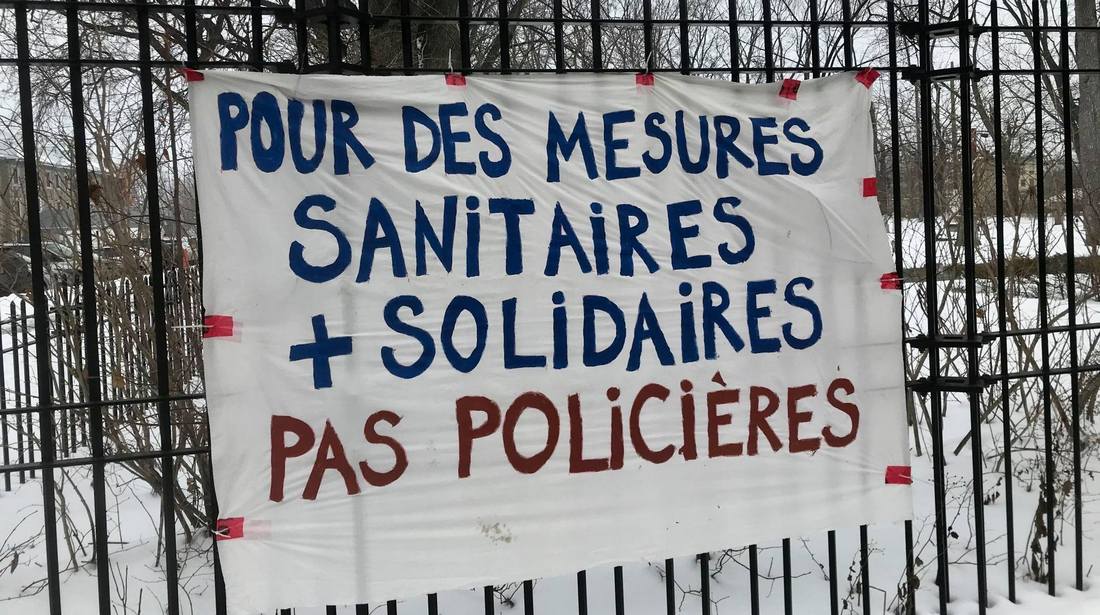
As the spread of COVID-19 results in higher numbers of
infections, hospitalizations and deaths, it has become clearer than
ever that workers organizing to push forward their demands and
solutions is key to curbing the spread and stabilizing the situation,
especially in the health care system. Workers speaking out and
organizing to protect
everybody, including themselves, as they deliver the services people
need is essential in affirming social solidarity of all for the
well-being of all. It is also only through this work and struggle that
working people can force those in authority to take up their
responsibility of protecting the people.
It is a tragic fact of life that after nearly 11 months of the
pandemic, safe working conditions for frontline workers have not yet
been achieved. Workers' demands for such basic things as adequate
personal protective equipment that they themselves determine is needed
based on their experience and public health standards have not
been universally met. Some health and safety measures are in place in some
workplaces but not others, according to random criteria decided by
unknown parties.
 Governments
and employers are looking for alternative sites where various health
services that do not require full-fledged hospitals can be delivered.
However, without adequate personnel and mobilization of the human
factor to sort out the issues of safety, training, maintenance, and all
issues related to the success of such projects, they will
come up against the same problems they are already responsible for
creating. Hoping that by mobilizing the armed forces to deliver
vaccines will guarantee efficiency is pie in the sky given the lack of
interest in putting human beings at the centre of social organization. Governments
and employers are looking for alternative sites where various health
services that do not require full-fledged hospitals can be delivered.
However, without adequate personnel and mobilization of the human
factor to sort out the issues of safety, training, maintenance, and all
issues related to the success of such projects, they will
come up against the same problems they are already responsible for
creating. Hoping that by mobilizing the armed forces to deliver
vaccines will guarantee efficiency is pie in the sky given the lack of
interest in putting human beings at the centre of social organization.
These projects can only be built with the pro-social aim of looking
after the well-being of all. This is where the fight is the most acute.
Workers are taking initiatives to lead the people in solving the crisis
in a manner that benefits the people and society but matters are not
under their control. Ruling elites continue to put forward schemes
which
they announce by decree such as curfews and fines no matter what
violations of workers' rights they entail.
Only by the workers mobilizing themselves, starting with the
organized collectives of workers, youth, women, Indigenous peoples,
community organizations and so on, can they exercise some sort of
control over what happens.
At this time there is discussion in Quebec about requisitioning
private surgery rooms and their staff to integrate them into the public
sector during the crisis so that they can do important surgeries that
are being postponed because of COVID-19, alleviating the situation in
the hospitals. There is no doubt that marshalling resources to face the
crisis has to be done but this requires the full mobilization of the
workers and medical authorities and others to ensure that it is done
safely. Health care workers told Workers' Forum
that this is an avenue that could help alleviate the pressure on the
health care system, provided that utmost care is taken to ensure that
this is done safely and
that it does not mean the expansion of private health care. They say
this is intended as a temporary measure to address the crisis.
In Ontario and other provinces, governments are talking of plans to
open up more hospital beds, temporary field hospitals, and other ways
to expand the system. But without addressing the demands of the workers
for increased staff and improved working conditions this will
exacerbate, not solve, the health care crisis. 
 A matter of serious concern amongst health care workers in Quebec and
elsewhere is to avoid implementation of what is called the
prioritization protocol for access to intensive care if the system is
overwhelmed. In Quebec, according to such a protocol designed by the
Quebec government, if the shortage of resources in intensive care
reaches
a breaking point and measures such as the transfer of patients from one
institution to another have become impossible, some patients would be
refused life-saving ICU treatment to make room for others deemed more
likely to survive. The protocol will be enacted when demand for ICU
beds across the province reaches 200 per cent of normal
capacity.
A matter of serious concern amongst health care workers in Quebec and
elsewhere is to avoid implementation of what is called the
prioritization protocol for access to intensive care if the system is
overwhelmed. In Quebec, according to such a protocol designed by the
Quebec government, if the shortage of resources in intensive care
reaches
a breaking point and measures such as the transfer of patients from one
institution to another have become impossible, some patients would be
refused life-saving ICU treatment to make room for others deemed more
likely to survive. The protocol will be enacted when demand for ICU
beds across the province reaches 200 per cent of normal
capacity.
Health care workers told Workers' Forum that the lack of
resources that would trigger such actions is the direct result of the
slashing of services by successive governments for over 30 years. It
has been made worse today by the untenable conditions imposed on health
care workers which results in workers becoming sick and having to
take leave, or resigning or opting for early retirement. The human
productive force is being wrecked under the hoax of taming budgetary
deficits and other anti-social pretexts so as to serve narrow private
interests. The consequences of this wrecking is invoked to justify
further wrecking.
Workers fight to affirm all human life and rights and do not agree
with these desperate proposals which go against their conscience. It is
like asking fire-fighters not to go all out to rescue everyone in a
burning building but to choose who lives and who dies. The fight of
workers for adequate and safe working conditions is directly linked
with
defeating this anti-social, inhuman, assault on society. 
- Steve Rutchinski -
On January 25, the Ontario government extended the "state of
emergency" first announced on January 12. The measures are aimed at
keeping the contagion of the COVID pandemic in check so as to "flatten
the curve" of infections before the public health system is completely
overwhelmed. The "state of emergency" is now set to expire on
February 9 unless extended again.
The concern is that the government is refusing to mobilize and bring
to bear the strength and organization of the workers and people to
flatten the curve. Marginalization of the people from being at the
centre of providing solutions to the problems facing society is the
reason why the situation is not brought under control. The Government of
Ontario has refused to even consider the recommendations of education
workers' unions and frontline health care unions, proposals that have
been consistent with public health guidelines and medical scientific
findings; proposals that would have minimized the risk of a second wave
following the start up of schools, work and commerce.
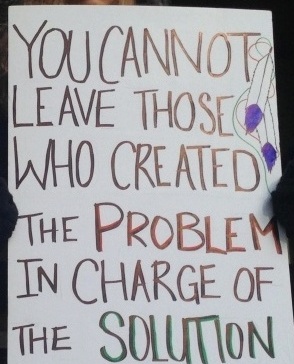 Neo-liberal privatization of practically every aspect of the public
health system has left Canada completely vulnerable when it comes to
meeting public health requirements. The refusal to provide adequate
personal protective equipment even for frontline health workers, let
alone for society at large, shows that the agenda to make the rich
richer
is criminal and workers must call for a change in the direction of the
economy. Neo-liberal privatization of practically every aspect of the public
health system has left Canada completely vulnerable when it comes to
meeting public health requirements. The refusal to provide adequate
personal protective equipment even for frontline health workers, let
alone for society at large, shows that the agenda to make the rich
richer
is criminal and workers must call for a change in the direction of the
economy.
The previous state of emergency declared in Ontario was used to
override the collective agreements of frontline health care providers,
imposing intolerable working conditions -- often without even adequate
protective equipment. The neo-liberal agenda of public sector wage
freezes, privatization and other pay-the-rich schemes exacerbates the
crisis. It comes as no surprise that in the midst of this crisis society
is facing the most severe health care staffing shortage yet.
Ontario responded to the first wave with legislation indemnifying
for-profit long-term care (LTC) operators from criminal or civil
liability for the hundreds of deaths in LTC homes. Private LTC operators
also received tens of millions of dollars in grants, and while
conditions for workers and residents remained largely unchanged, these
corporations paid out huge dividends to owners.
Ontario education workers' unions developed serious protocol measures
to ensure reopening schools would not be a disaster for society, only
to be blocked no matter what avenue they tried to be heard. The fact is
that the democratic institutions as they presently exist do not permit
workers and their organizations to have any say whatsoever in
decision-making to manage this pandemic.
Ontario's government blames the people for ignoring public health
guidelines. It claims the state of emergency and stay-at-home order is
necessary because people do not act responsibly.
In fact, the workers and people of Ontario have been and continue to
take up their social responsibility to the best of their ability, to
keep themselves and their communities safe. However, their lack of
control over the decision-making power must be addressed by getting rid
of the system of cartel party government which claims that through their
vote during an election they authorize others to speak and act in their
name. It is a fraud. The cartel party system of government serves the
rich. Such governments do not represent the people.
As it stands at present, Ontario workers have to step up their fight
in defence of their rights so that the rights of all are protected and
governments do not get away with their failure to do their duty as the
people understand it.
Restrictions in Ontario
Ontario has been put under a stay-at-home order, which requires
everyone to remain at home with exceptions for essential purposes, like
going to the grocery store or pharmacy, accessing health care services,
for exercise or for essential work.
There is no in-class instruction until February 10 at the
earliest for the following public health units: Windsor-Essex, Peel
Region, Toronto, York Region and Hamilton.
All businesses must ensure that any employee who can work from home does so.
Outdoor gatherings are restricted to five people, consistent with the first-wave lockdown rules.
Masks remain mandatory indoors at open businesses or organizations.
Masks are also now recommended outdoors where physical distancing of
more than two metres is not possible.
All non-essential retail is closed as of 8 pm and open no earlier
than 7 am. These limits don't apply to stores that primarily sell food,
gas stations, pharmacies, convenience stores or restaurants providing
take-out or delivery.
Non-essential construction is further restricted, including below-grade construction, exempting survey.
There are no restrictions on the purchase of non-essential items.

- Pierre Soublière -
During the Christmas holidays, Quebec's Administrative Labour
Tribunal (ALT) intervened to force nurses at the Gatineau Hospital to
work the December 25-26 night shift. One of the nurses forced to stay at
work had worked several 12-hour shifts as well as overtime during the
week and was exhausted. The president of the Outaouais
Health Professionals Union, Patrick Guay, explained that the same nurse
had only requested two days off during the holidays, but was forced
nevertheless to stay on the job and work overtime.
 The ALT ruled that the "concerted" refusal to work overtime
represented an "illegal pressure tactic," which could "jeopardize a
service which belongs to the public by right." The judge thus ordered
the nurses to work their regular workday and to do the extra required
overtime. The ALT ruled that the "concerted" refusal to work overtime
represented an "illegal pressure tactic," which could "jeopardize a
service which belongs to the public by right." The judge thus ordered
the nurses to work their regular workday and to do the extra required
overtime.
This ALT ruling is yet another measure which increases the arsenal of
what are called legal measures which are put at the employer's disposal
to manage its staff without taking into account collective agreements,
the right to refuse unsafe work, nor the most basic sense of and respect for health
and security for the workers and the people they tend to.
Ministerial orders were imposed in March by the Legault government
which, among other things, allow health and social services centres to
cancel planned holidays and force part-time employees to work full-time.
The employer, the Integrated Health and Social Services Centre (CISSS),
states that it is counting on nurses to show their "solidarity,"
since 40 per cent of Outaouais nurses are part-time. This call to a
so-called "solidarity" is backed by fines which can go from $1,000 to
$6,000.
What governments have always accused health workers of doing --
holding the population hostage when they undertake actions to defend the
right to health and to humane working conditions -- is precisely what
they themselves are doing. It is not fortuitous that workers have issued
public distress calls that they are being held prisoner in their
places of work!

Interviews
- Marjolaine Aubé -
Marjolaine Aubé is President of the Union of Workers at the
Integrated Health and Social Services Centre of Laval (CISSS de
Laval-CSN).
Workers' Forum: How would you describe the current situation regarding the fight against the pandemic at the CISSS of Laval?
Marjolaine Aubé: I would describe the situation as very
critical and grim. During the first wave, COVID-19 infection was mainly
in the residential and long-term care centres (CHSLDs) and seniors'
residences. As for the situation at the hospital in Laval, there wasn't
much going on, it was almost deserted. The second wave is
expressing itself everywhere. Several establishments are affected,
including the hospital where there are many outbreaks. It's going
faster, it's not concentrated in the residential centres but everywhere,
in all our facilities. We also have patients who have been transferred
to the Laurentides and Lanaudière regions, because they are a little
less
affected, while Laval is once again being hit hard.
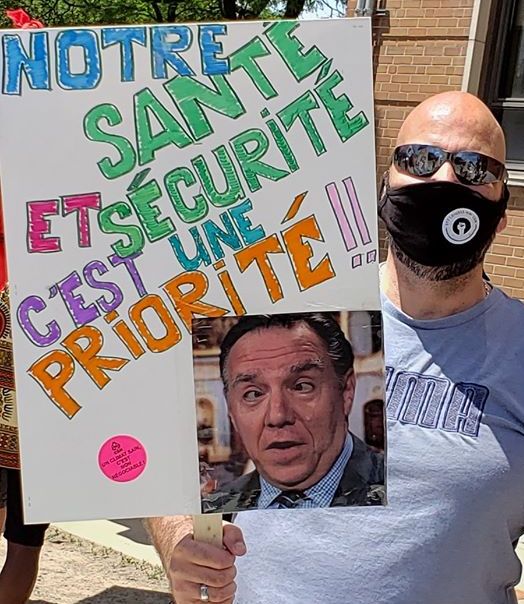 In addition, there is the whole issue of
ventilation systems in our
facilities. We have a concentration of patients who are infected with
COVID-19. We have facilities that are very old and we also have
facilities that are newer. Over the years, the facilities have been
renovated on the inside. Where we had one office, for example, it may
have
been rearranged into four offices, separated by partitions, but the
ventilation system was not changed. The ventilation system is no longer
optimal. A report has just been submitted by the National Institute of
Public Health of Quebec (INSPQ) which makes many recommendations
regarding ventilation systems and equipment, and proposes several
measures. It is clearly stated in the document that if all the required
measures are not put in place, it will not work, that the measures are
complementary. In addition, there is the whole issue of
ventilation systems in our
facilities. We have a concentration of patients who are infected with
COVID-19. We have facilities that are very old and we also have
facilities that are newer. Over the years, the facilities have been
renovated on the inside. Where we had one office, for example, it may
have
been rearranged into four offices, separated by partitions, but the
ventilation system was not changed. The ventilation system is no longer
optimal. A report has just been submitted by the National Institute of
Public Health of Quebec (INSPQ) which makes many recommendations
regarding ventilation systems and equipment, and proposes several
measures. It is clearly stated in the document that if all the required
measures are not put in place, it will not work, that the measures are
complementary.
We have been asking for ventilation reports from the employer since
July. The employer kept promising it would provide them but it never
did. The nurses' union finally made an access to information application
but given the delay, between July and now, which is too long, we filed
20 complaints about the ventilation systems of the Laval
CISSS with the Labour Standards, Pay Equity and Workplace Health and
Safety Board (CNESST). We now have an inspector on the file, who has
started her inspections and has already found that many things are not
working. She has given the employer 10 days to provide the necessary
documentation for her to do her inspections. We're on hold
as to what the inspection is going to yield.
The claim of the three unions at the CISSS has been the same since
March. COVID-19 is airborne and we must have N95 masks. The INSPQ has
just recognized that the disease is airborne. The World Health
Organization has been saying this for a long time, as has Health Canada
and other organizations. Many health experts are urging the
provincial and federal governments to provide health care workers with
adequate equipment, namely N95s. We are asking for N95s and we are doing
it through the CNESST, we are asking for the assistance of the CNESST.
We filed another complaint concerning our workers at the emergency
room of La Cité de la Santé Hospital. The emergency room operates in
modules, depending on the type of illness and treatment. In these
modules, they did not make green, yellow, or red zones, based on levels
of COVID-19 infection. The patients are all mixed up together.
A nurse goes from a red patient to red, another goes from yellow to
yellow, another from green to green. The orderlies, on the other hand,
are going indiscriminately from red to green to yellow, allegedly
because they don't spend enough time with the patients to get infected.
We complained to management, who told us that they were following the
standards for emergencies. We complained to CNESST and found the INSPQ
documents that deal with how to organize an emergency during the COVID
pandemic. According to INSPQ, in emergencies there must be defined red,
yellow and green zones and there must
be no mobility of personnel. In addition, in the guide for emergencies,
patients must be two meters apart and there must be a separation between
them.[1]
We do not yet have adequate working conditions to stop the spread of
COVID-19 and protect workers and patients. There is still staff
mobility, although it is not the same everywhere.
The government and employers are looking for non-traditional sites to
house patients with COVID-19. But we are the same people, the same
staff. Yes, there have been additions of orderlies but the rate of
worker contamination continues non-stop. The main types of jobs where
people are off work because of COVID-19 are the orderlies, the
administrative clerks, who are the point of entry to the clinics, local
community service centres (CLSCs), etc., and housekeeping. We have
noticed in Laval that often, if we have an infected patient, we have an
infected employee. In some cases we have one for one, but many times
there is one patient and two infected orderlies.
WF: Do you want to add something in conclusion?
MA: One of the key issues that needs to be addressed is
the N95 mask. Until this is resolved, our situation is going to be very
problematic, that's for sure. We are more than tired of always having
to demand the N95. We want the INSPQ recommendations on the airborne
character of COVID transmission to become compulsory
for employers.
Certainly, containment is something difficult, but people have to
imagine that we've been in combat since March and we still haven't seen
the end of it. We're telling everyone, "Help us help you."
As far as we are concerned, our slogan is "We are not giving up on
anything." The situation has forced us to become experts ourselves on
all sorts of levels, in health and safety, masks and protective
equipment, the mode of transmission of the disease, public health, etc.
We have to be self-taught because it's not in the manuals that we find
all
this. For example, we learned with the pandemic that the precautionary
principle contained in the Occupational Health and Safety Act no longer exists in reality, at least not in our CISSS.
This is why our slogan is "we're not giving up on anything."
Note
1. Following the interview the union reported a success in its complaint about the emergency room at the Cité de la Santé.
The union's Facebook page states:
"Subject: mobility of PABs [orderlies] in the different zones: from red to yellow to green etc.,
"Today was the meeting with the employer, a representative of CNESST
and two emergency directors from the Ministry of Health and Social
Services.
"We said NO to moving between zones and the decision was taken immediately by CNESST.
"The employer must, within a period not exceeding 10 days, put in
place extraordinary measures to prevent any movement between the
coloured zones. These measures include the presence of PCI [Infection
Prevention and Control] coaches 24 hours a day, seven days a week,
pending an adequate organization of work that does not require any
mobility.
"Congratulations to the Health and Safety team!!
"Your union executive."

- Jason Fraser -
Jason Fraser is the Chair of the Canadian Union of Public Employees Ontario Ambulance Committee
Workers' Forum: A recent CUPE press release refers to
paramedics' Workplace Safety and Insurance Board (WSIB) claims being
denied when they have contracted COVID-19 in the course of their duties.
Can you tell us more?
Jason Fraser: The situation was in Waterloo. We had
paramedics who contracted COVID-19 in the course of their work. They had
contact with a COVID-19 positive patient and they themselves became
infected. When they put in their WSIB claim, their employer disputed the
claim based on the fact that they were wearing full
personal protective equipment (PPE) while they were working so they
could not have contracted COVID-19 from the patient because, according
to the employer, they were well protected.
The union's position is that while PPE is a great tool that helps to
limit our exposure, it is definitely not a foolproof piece of equipment.
PPE could fail, which could result in our becoming infected with
COVID-19.
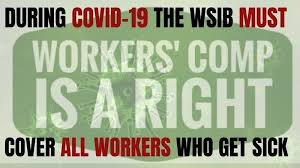 We are calling on the Ontario government to do a couple of things,
not just for paramedics but for all essential workers. We believe that
there should be presumptive legislation passed by the government that
provides that if you are an essential worker and you get infected with
COVID-19, it is presumed that you have contracted that virus
through the work you do. Workers' compensation would automatically
apply. We are also calling on the Ford government, and this is a broader
CUPE call, to institute paid sick days for all workers. People should
not have to make a choice between going to work when they are sick and
doing the right thing by staying home and getting better. We are calling on the Ontario government to do a couple of things,
not just for paramedics but for all essential workers. We believe that
there should be presumptive legislation passed by the government that
provides that if you are an essential worker and you get infected with
COVID-19, it is presumed that you have contracted that virus
through the work you do. Workers' compensation would automatically
apply. We are also calling on the Ford government, and this is a broader
CUPE call, to institute paid sick days for all workers. People should
not have to make a choice between going to work when they are sick and
doing the right thing by staying home and getting better.
This is one event that occurred. There are other instances throughout
the province where paramedics and dispatchers have been required to
self-isolate for a number of different reasons. It's a mixed bag as to
how employers respond to situations. Some employers are providing
payment and supporting their employees if they have to self-isolate
under the direction of Public Health wand others are not supporting
their employees. They require the workers, if they are full-time and
have access to sick time or vacation time to use that leave to be paid.
Those who are part-time and don't have access to those leaves have to
stay home without pay. This is happening right across the province.
One of the Waterloo paramedics was a part-time paramedic with no access
to paid sick day from their employer.
Paramedic services were allocated $77 million back in the spring of
2020 to offset costs associated with COVID-19. We believe that some of
those monies could be allocated towards covering pay for paramedics and
dispatchers when they are required to self-isolate, to support them
during these difficult times.
WF: The CUPE press release also opposes the Ontario
government for the wide use of restrictions and punishment of
individuals rather than holding employers accountable when workers
contract COVID-19.
JF: Yes, the Ford government is blaming the citizens of
Ontario, saying they are not following appropriate public health
measures, including isolation and physical distancing, but it is not
holding the employers accountable. If they held the employers
accountable and ensured that they supported the workers, which would go a
long way in protecting workers and controlling the virus as well.
We call upon the Ford government to support the frontline workers
that are out there every day and do not have the option of working from
home, to support them, to make sure they have paid sick days and make
sure workers who are continuing to work are able to support their
families.

(To access articles individually click on the black headline.)
PDF
PREVIOUS
ISSUES | HOME
Website: www.cpcml.ca
Email: workerscentre@cpcml.ca
|

